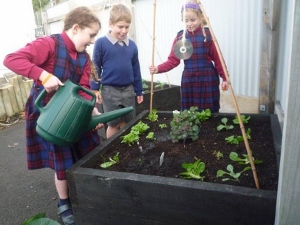

<p><img class=" alignright size-full wp-image-1176" src="http://schoolnewsnz.fastrackdev.com/wp-content/uploads/2014/11/SND09-wk3-Bayer_Fund_300x225.jpg" alt="SND09-wk3-Bayer Fund 300x225" style="margin: 5px; float: right;" width="300" height="225" />Nine primary schools throughout New Zealand are set to get a whole lot more environmentally friendly after successfully applying for grants from the Bayer Primary School Science Fund.</p>
<p> <!--more--> </p>
<p>The fund offers up to $2000 per school to assist with a variety of environmental science projects.</p>
<p>Successful schools from the current funding round have opted to use the money to research how they can improve their surrounding environment.</p>
<p>Funds will be spent on a variety of equipment and initiatives, including: microscopes, weather stations, stream monitoring equipment, trees and plants, digiscopes, soil testing kits, compost containers and gardening equipment.</p>
<p>Bayer managing director Dr Holger Detje says it is great news to see primary schools using the fund in a way that benefits both the schools and their communities.</p>
<p>&#8220;These projects not only teach the children so much, but they are also an investment into our environment as a whole.</p>
<p>&#8220;It is fantastic to see that students are able to learn about the benefits that science can create for the environment.</p>
<p>&#8220;Bayer has a wide knowledge of science, people, plants and animals so it is great that we can help primary schools extend their own knowledge.&#8221;</p>
<p>Administered by the Royal Society of New Zealand, the Bayer Primary School Science Fund is worth $120,000 over three years and is designed to give primary schools the opportunity to apply for funding to support environmental science education and resource Nature of Science activities.</p>
<p>Royal Society of New Zealand <a class="wpil_keyword_link" href="https://www.schoolnews.co.nz/2015/10/new-chief-executive-for-education-council/" title="chief executive" data-wpil-keyword-link="linked" target="_blank">chief executive</a> Andrew Cleland says the organisation is committed to advancing quality primary science education by encouraging primary students and their teachers to understand, participate and contribute to authentic science activities.</p>
<p>&#8220;Through hands-on scientific investigations, these young people will learn more about their local environment and how to improve it. They will gain an appreciation of the relevance of science and technology to their daily life and learn the skills of critical thinking that they can apply widely.</p>
<p>&#8220;We are pleased this fund is assisting schools to deliver these valuable programmes, which are contributing to better-informed, environmentally aware communities.&#8221;</p>

Since 2015, fewer students are completing secondary school, defined as remaining enrolled in education until…
As the country’s Indian population grows, so does demand for Indian languages like Hindi, Punjabi…
By promoting alternate qualifications, some schools may have undermined public trust in NCEA, explains an…
When young people immerse themselves in nature, they leave feeling physically, mentally, emotionally and spiritually…
Theatre is much more than performance. Deep skills can be developed across multiple curriculum areas,…
NZCER found generative AI tools are frequently used to support teaching and learning in primary…
This website uses cookies.